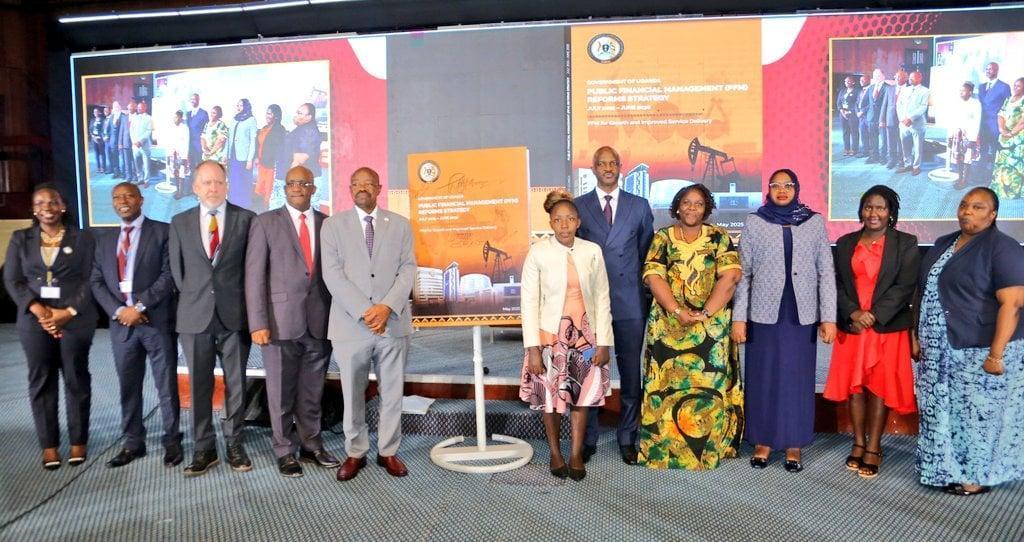Africa-Press – Uganda. Government has officially launched the Public Financial Management (PFM) Reform Strategy 2025–2030, a bold initiative aimed at transforming how public funds are mobilized, allocated, and utilized.
The strategy prioritizes efficiency, fiscal discipline, digital innovation, and people-centered governance in a bid to accelerate service delivery and inclusive development.
Unveiled at a high-level event in Kampala, the reform plan represents a significant shift toward outcome-based budgeting and enhanced transparency in government spending.
Speaking during the launch , the State Minister for Planning Amos Lugoloobi said the strategy marks a renewed commitment to ensuring that public resources deliver tangible results for citizens.
“This strategy reaffirms our obligation to manage public resources transparently and ensure that every shilling raised is used to improve the lives of Ugandans,” Lugoloobi said.
“Our goal is not just about compliance, but about results. A classroom must mean learning. A hospital must save lives. That is the accountability we owe the people.”
Anchored on six pillars—domestic revenue mobilization, expenditure control, digital financial systems, improved budget execution, institutional capacity building, and better service delivery—the PFM strategy aligns closely with Vision 2040 and the Fourth National Development Plan (NDPIV).
According to Lugoloobi, public financial management is the backbone of service delivery.
“It is what translates government plans into actual outcomes—be it roads, schools, or hospitals,” he said.
The strategy also emphasizes reducing dependence on foreign aid by strengthening domestic tax administration and reviewing the impact of tax incentives and exemptions.
“If we are to build self-reliant economies, we must strengthen our capacity to mobilize domestic resources in a way that is fair, efficient, and growth-oriented,” Lugoloobi noted.
He noted that said the strategic direction of the strategy is intended to give Uganda the catalytic leap forward in attaining the goals of the tenfold growth strategy by strengthening key growth levers.
A core aspect of the reform is the mainstreaming of digital technology across all financial processes—from planning and budgeting to payments and reporting.
“We cannot afford to manage public finances with outdated manual systems. Digital technology is not a luxury, it is a necessity,” Lugoloobi noted.
The strategy also prioritizes automation and integration of financial systems, especially at local government levels where service bottlenecks are most felt.
It also shifts focus from output-based reporting to actual outcomes in key sectors like health, education, and water.
“A health center must not only be built—it must be equipped and staffed to serve,” Lugoloobi stressed.
He further urged investment in vocational skills to address youth unemployment and mitigate future social unrest.
“Neglecting our growing youth population will only increase crime and instability,” he cautioned.
Ramathan Ggoobi, the Permanent Secretary and Secretary to the Treasury said the strategy is designed to make Uganda less reliant on external financing while creating jobs and empowering communities.
“PFM must become an engine for inclusive economic growth—not just a tool to control expenditure,” Ggoobi said.
He highlighted key growth drivers such as agro-industrialization, tourism, mineral beneficiation, and technology, noting their potential to expand the country’s tax base.
“This strategy includes evidence-based reviews of our tax policies to ensure we are not giving away more than we gain,” he said.
A critical part of the strategy is institutional capacity building, with Ggoobi emphasizing that no reform can succeed without skilled and motivated public servants.
“We must invest in people. Accounting officers must take full ownership of these reforms and lead by example,” he said.
Beyond system improvements, the reform aims to restore public trust in institutions by proving that government spending can deliver real impact.
Citizens, private sector players, and civil society organizations have been encouraged to actively support the implementation process.
The PFM Reform Strategy 2025–2030 sets the stage for a more efficient, accountable, and digitally enabled public sector—capable of delivering on Uganda’s development aspirations.
For More News And Analysis About Uganda Follow Africa-Press






